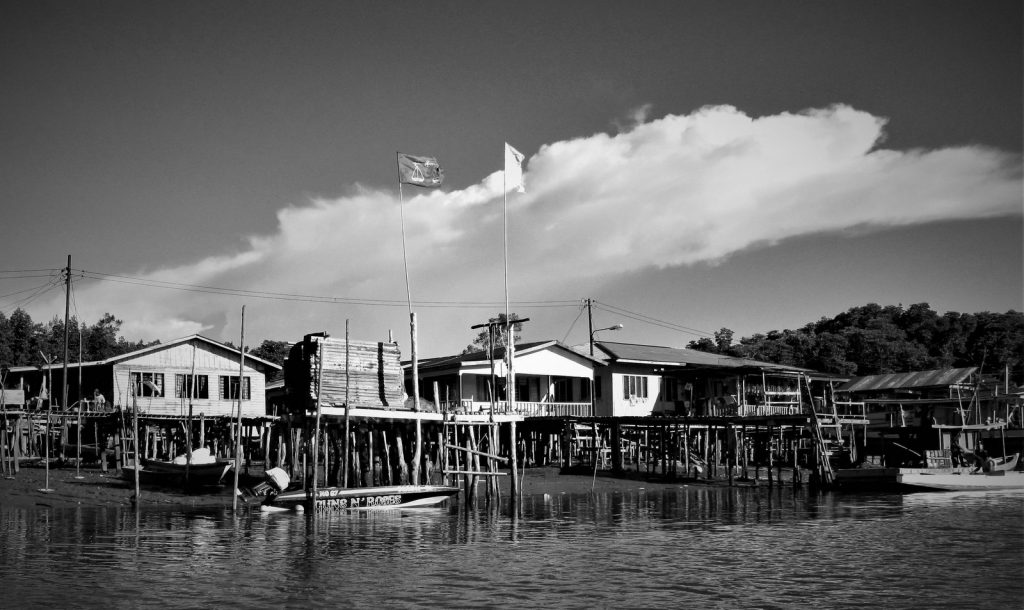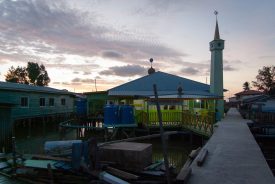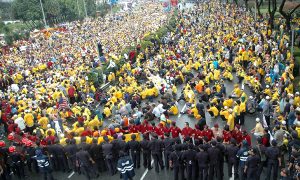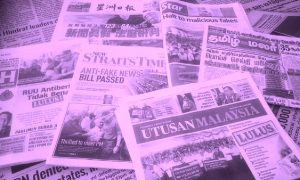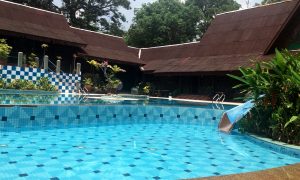My mother comes from a family of proud planters who have lived in the district of Tenom for decades. When I was a child, my parents would take my brother and I from Kota Kinabalu for visits to Tenom to visit my grandparents and develop a familiarity with the town. Once there, we would visit the family plantation, to learn more about the crops we grew and the workers who tended to them. Large trucks would gather gunny sacks full of cocoa in the 80s and 90s, and from the early 2000s onwards bananas and pomelos, to be sold to distributors. Work was hard but life was uncomplicated for my mother’s family. I treasured each visit to Tenom as an opportunity to experience life outside of the urban centre. It provided me with an insight to life in the periphery. But more importantly, my roots in Tenom have helped me frame personal notions of indigeneity, heritage, and what it means to be Sabahan.
That is, until my most recent visit.
While munching on my favourite breakfast of kochung kacang (peanut rice dumplings), I learned that an aunt of mine was only declared a Malaysian citizen in the early 1990s. For the years prior to that, she held a red identity card and had lived her life as a permanent resident of Malaysia. My aunt told me that her late father had served as a British civil servant out in a Malayan peninsula state. She was born there in 1959, and to ease the young family’s return to North Borneo the following year, she was issued a British passport. After Malaya, Sarawak, Singapore, and Sabah merged to form the newly formed Malaysia in 1963, identification documents were not the most pressing of issues for indigenous communities in the interiors, my aunt explained, who recalled receiving a residence certificate about the time she turned 14 years old.
The details of the transition from that residence certificate to her red IC (identity card) are a little fuzzy, as she is unable to pinpoint the exact date she was declared a permanent resident (sometime in the early 1970s). It was only after years of coercion and help from her husband, which included countless of visits to the National Registrar’s Office in Kota Kinabalu, was she finally able to legally call herself a Malaysian citizen. She told me up until the approval of her citizenship, she often questioned her worth as a Sabahan. In pidgin English, she explained to me how distressed she felt while awaiting approval and how she almost lost hope of eventually being recognised as a citizen.
“Hairan bah (It’s surprising), I knew no other world apart from Sabah, but just because some documents didn’t match, durang bilang (they told me) that I was a permanent resident. Banyak taun oh (many years) I waited, I didn’t think bulih dapat (I could get it).”
And yet despite this flaw in her personal record, she considers herself lucky to have finally gotten her citizenship. “I made it, but other Sabahans macam mana (what about the other Sabahans)? Must be grateful bah,“ she reminded me. She was right, sadly; mislabeled identities are not an anomaly in Sabah. Such as with fellow Tenom resident Lai Yun Lan @ Amilik, a Sino-Dusun in her fifties, who despite having the sufficient documents to prove her citizenship, was issued permanent residence in the late 1990s after having held a Green IC for temporary residents (Daily Express, 2016). Another case, Rita Joan Thomson, an 80 year old of Bajau heritage from the town of Papar, never possessed a birth certificate as she was born before World War II. Years after the formation of Malaysia, she too was issued a red IC and despite appealing her case to two Deputy Chief Ministers for her application for Malaysian citizenship, she is still considered a non-Malaysian resident in Sabah (Sabahkini, 2016).
Motivated to learn more about the identification process in Sabah, I convinced my cousin to give the National Registry Department a call. On the speakerphone, she spoke to a Raudiyah* who politely confirmed with us that my aunt only became a citizen of Malaysia in 1995. When asked why it took so long for her to be recognised as Malaysian, Raudiyah explained that kelulusan (approval) required the consideration and consent of multiple departments, which in some cases meant the Attorney-General’s Chambers. “But why are there still Sabahans who have yet to get their citizenships approved?” my cousin pressed, to which Raudiyah explained:
“These things are difficult to estimate because we have to consider so many factors. But don’t worry ini memang perkara biasa kalau di Sabah (this is a common occurrence in Sabah).”
Friends I have shared this story with expressed their irritation at both of us for not voicing more anger at her. But being unkind towards Raudiyah would have solved nothing, especially when she was doing her job with all due diligence. Instead, I considered my conversation with her an eye opener, because Raudiyah’s explanation pointed at a glaring problem: the normalising of the irregularity of being Sabahan, which should be understood from two respects. The first and more obvious point to make is the regretful conditions of one’s presence being unfavourably mislabelled and wilfully disregarded by a government structure. And when it isn’t a reality for a portion for Sabahans, it remains a possibility for the rest, which ultimately needs to be corrected. Already geographically located so far away from the Malayan centre, it is not surprising why so many Sabahans feel detached from a greater Malaysian narrative, only to be dealt with the deliberate ignorance of the federal government in handling an already delicate Sabah identity. But this we already recognise and has been political fodder of the opposition and critics for years.
The second and more important issue at hand goes beyond neglected identity cards and birth certificates. The subject of misidentification is not just a Sabahan problem per se, with a number of similar cases found amongst other indigenous groups in Sarawak and lower income communities of Indian descent in the peninsula of Malaysia. It instead points at a much more sinister heritage of Sabah lacking any autonomy for many of its affairs and a people not having enough legs to demand for change. When I asked my aunt why she never questioned receiving a permanent residence card, she said “Biasa la bah urang kami (you know how our people are), too polite. I just duduk diam sja (kept silent) and accepted it.” It is a passiveness that I’m all too familiar with, one where the default seems to be in accepting these socio-political apertures without much knowledge or strength to improve on it.
Having worked in Sabah as an anthropologist for several years, I often listened to Sabahans lamenting about their unhappiness at the current federal and state governments for deliberately neglecting the dire needs of Sabah. Their complaints varied; from the ongoing surge of irregular migrants into the state, to the numerous undeveloped and forgotten clusters of rural villages, it seemed that the participants of my research had an unending list of problems with the way the state is run and how they were, in turn, treated. To be frank, I never disagreed with what I heard, simply because there is indeed a truth to the grouses. As a Sabahan myself, I too think there are necessary political changes that needs to be achieved to enable improvements.
But what Sabah needs more than anything else are leaders and statesmen who are determined to solve Sabah’s long overdue need for autonomy, without fear of injuring a federal government’s pride. The need for greater assertion in Sabah is certainly long due. More than anything, politicians from either side hoping to represent Sabahans at GE14 must be demanded to push for a more respected position in Malaysia. One can only hope, with caution, that this election can rouse enough demand for change to finally address the pileup of ignored Sabah issues. Sabah voters too must realise the power of articulating their vexations and embracing their hunger to reject and denormalise archaic practices of subjugation. Sabah is a state lavished with natural resources, yet it remains so riddled with a legion of insecurities. A utopic Sabah envisioned by the participants I speak to can only truly materialise through their own self-empowerment and nothing else.
In mid 2017, during the last few days of my fieldwork in Sandakan, I was casually introduced to a group of supporters of Parti Warisan Sabah (Sabah Heritage Party), Sabah’s newest political party, which is led by Shafie Apdal, the former federal Minister of Rural and Regional Development. At a coffee shop situated at the IJM township in mile 6, a group of eight or nine men gathered waiting for George Hiew, the local Warisan coordinator. I did not meet him that day but my encounter with his supporters gave a good glimpse of what they wanted to fight for. Mat*, a used car salesman and strong Warisan advocate, had agreed to help sell off my fifth-hand Perodua Kancil in that very coffee shop and had asked me to join the gathering while waiting for potential buyers. It was a hot afternoon, and rather than walk back to my apartment, only a mere five minutes away, I agreed.
There, the men spoke loudly about the political goings on in Sabah, each taking their turn at criticising the most recent rumoured act of corruption committed by members of the ruling coalition. Eventually their attention turned to me where I was asked if I supported the Barisan Nasional (BN). I replied cheekily “samua pun sama saja bah (they’re all the same).” The men were not shy to disagree with me and insisted that Warisan was nothing like the other political parties. Passionately, they explained Warisan’s manifesto of vanquishing a Malayan-centric approach to running Sabah and will eventually bring economic opportunities to the less developed areas of Sabah by building a better sea port in Kudat, and relocating the state’s education hub to Sandakan. They believed in the change their party and Shafie Apdal could bring them simply because he was their answer to ending Barisan Nasional’s hypnosis over Sabah.
But as moved as I was by their enthusiasm for Warisan and the future of Sabah, I reminded them that every Sabah politician has essentially promised change for Sabah that resembled this preliminary manifesto. In a state known as the “fixed deposit” of BN at every election, their odds seemed completely against them. How, I asked, did Warisan plan on convincing Sabahans to vote for them, if ever? The men were quiet for a while until Robbie*, a Dusun-Suluk estate manager and father of three, agreed with me. His regret was how Sabah had been left “bingung” (confused) after years of external control by the federal government. In a half smirk he told me:
‘Aku nak Islam lama balik’: a look at one kampung in Sabah
Dina Zaman on how the religious tensions of Peninsular Malaysia are being imported to Sabah.
Robbie’s deliverance was aimed at highlighting a reality about the Sabahan dilemma that has been much overlooked, and it had certainly gotten his peers’ approval. So impactful was his point to his fellow Warisan supporters, that they chuckled/cheered for him, patted him on the back and nodded in agreement. Mat, who remained silent up throughout, had also chimed in: “Urang Sabah kana butul-butul for the first time, bikin apa yang patut. Tinguk lah nanti, kak. Barubah kami kalau sama Warisan. Nanti jadi sudah, aku call sama kau ok?” (Sabahans have to do what is right for the first time. Just wait and see, sister. We will change if we’re with Warisan. When it happens, I’ll give you a call ok?)
I said nothing but smiled, unsure of what could follow the conversation. It wasn’t long till most of the men left the coffeeshop, leaving a behind a faint hue of their affirmation on the empty chairs. That evening, Mat managed to sell my car for much more than I expected (a talent I wish I had), and two days later, I ended fieldwork in Sandakan. I still keep in touch with many of my informants till today, as they share with me of the latest ongoings in their respective villages. The GE14 has brought many optimistic political candidates into town of late, all of whom are trying to say the right things, they tell me.
However, I still haven’t received that phone call from Mat yet, but I’m still hopeful.
*Pseudonyms used to protect participants
 Facebook
Facebook  Twitter
Twitter  Soundcloud
Soundcloud  Youtube
Youtube  Rss
Rss 